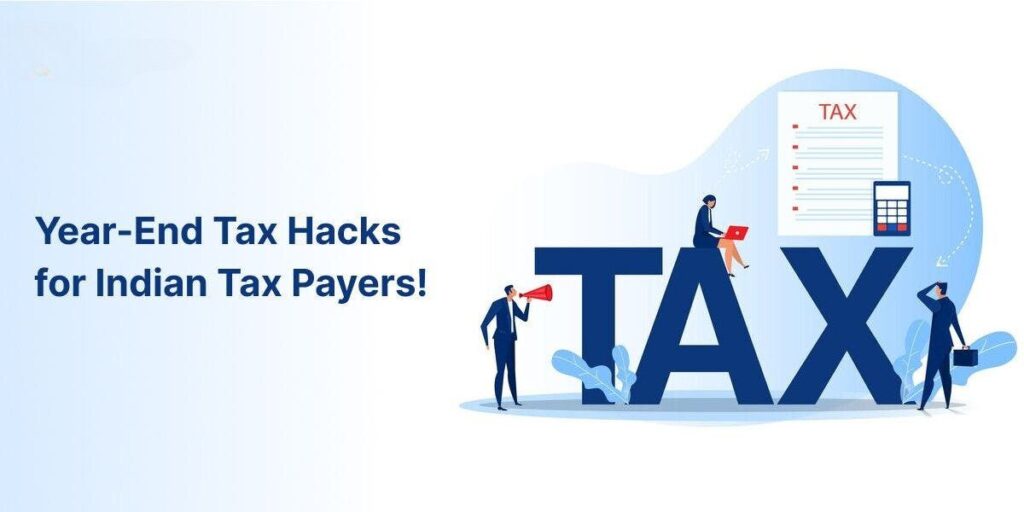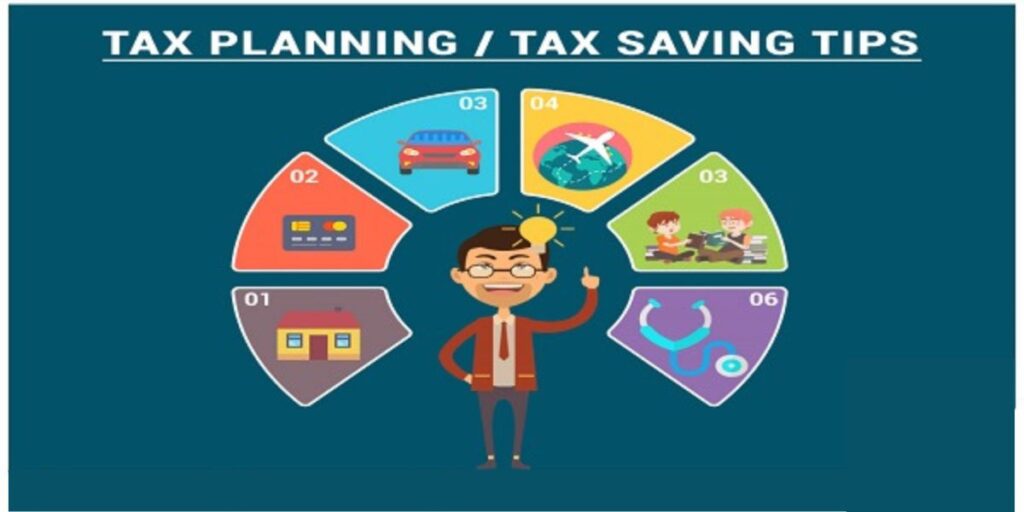Effective Tips for Taxpayers on Year-End Tax Planning

As the year-end is approaching, it’s vital to spare some time on income tax planning. Tax planning not only helps in saving your hard-earned money on taxes, but it also helps in enhancing your income.
Many personnel or companies seek professional help from experts since these experts are well-versed in tax planning strategies and can guide you in planning your taxation in the best possible manner. One such reputed and reliable company is Choksi Tax Services (CTS) whose experts provide the best guidance to all your tax issues.
To alleviate the burden of taxes, The Income Tax Act offers many exemptions on direct taxes that are charged on the income of the individual/company. This blog is all about the strategies that can be implemented to minimize tax liabilities.
➨ Tips for Effective Year-end Tax Planning:

1: Assess your Income & Deductions:
Calculate your total income (salary, bonus, other income, etc.) and check out the deductions that are available on it.
The deductions on income are available under sections 80C, 80D, and 24(B). Ensure that you make the most of these to decrease your taxable income.
2: Optimise Investments under Section 80C:
By investing in government schemes, you can maximize your deductions as per Section 80C and minimize your taxes. The Section 80C provides deductions on varied investments on the amount invested or Rs. 1.5 lac/per year whichever is lower.
The investments include:
-
Life insurance premium paid for self, spouse, and children
-
Employee Provident Fund (EPF)
-
Public Provident Fund (PPF)
-
5-year Tax Saving Fixed Deposit with a bank or post office
-
National Savings Certificate (NSC)
-
Equity Linked Savings Scheme (ELSS)
-
National Pension Scheme (NPS)
-
Sukanya Samriddhi Account (SSA)
-
Senior Citizen Savings Scheme (SCSS)
-
Home loan principal repayment
-
Stamp duty, registration fee, and some other specified expenses paid towards the purchase of a house property
-
Tuition fees are paid to an education institution in India for the full-time education of any two children.
When your income is channeled into these investments, it decreases the taxable income by exempting a part of the amount, thus enhancing your wealth.
➨ Purchase a Health Insurance Policy:
A smart tax-saving strategy is to invest in a health insurance policy for yourself and your family members. This will permit you to claim tax deductions on the premium paid under Section 80D, thus reducing the burden of taxes. Depending on your age, varied tax exemptions are available on the policy amount.
-
-
A taxpayer can claim a deduction for health insurance premiums paid for self, spouse, and dependent children. The maximum deduction permitted in a financial year is the amount of premium paid or Rs. 25,000, whichever is lower.
If you or your spouse are senior citizens, the maximum deduction amount permitted is Rs. 50,000. -
A taxpayer can claim a separate deduction for health insurance premiums paid for parents. Here, the maximum deduction permitted in a financial year is the amount of premium paid or Rs. 25,000, whichever is lower.
-
Here too, If one or both parents are senior citizens, the maximum deduction amount permitted is Rs. 50,000.
4: Avail Home Loan Benefits Under Section 24B:
Section 24B of the Income Tax Act permits the deduction of interest on home loans from taxable income. This loan should be taken for the purchase, construction, repair, or reconstruction of the house property. Deduction on this loan is allowed on an accrual basis, not on a paid basis.
-
-
An individual can claim a tax deduction (on interest amount) up to a maximum limit of Rs.2,00,000 for a self-occupied house or a rented house. This deduction amount reduces to Rs. 30,000 if the loan was taken before 1st April 1999 for housing purposes.
-
In the case of renting a newly purchased home, the entire interest component is exempt from annual income tax computations.
-
Indian citizens who buy a property for building their home can avail of tax exemption from Section 24B, only if the construction process for the same is completed within five years.
-
5: Restructure your Salary:
Have a word with your employer and convince him to restructure your salary to avail the benefit of paying reduced taxes.
6:Timely Submission of Investment Proofs:
Ensure timely submission of investment proofs and other vital documents to avoid tax penalties and other unnecessary taxation charges.
7:Capital Gains Tax Management:
There are two major investment avenues wherein capital gains tax is saved or minimised. Both factors can be wisely addressed, to lessen the capital gain tax.
-
-
Bond Investment:
-
To avail of maximum (capital gain) tax exemption on bond investment, you should invest the sum earned in Capital Gains Bond which are issued by the National Highway Authority of India and the Rural Electrification Corporation within 6 months of the transfer of the sum and realization of gains. Additionally, the funds need to be invested in these bonds for a minimum of five years as a lock-in period and the maximum amount which can be invested is Rs. 50 Lacs.
-
-
Property Investment:
-
To avail of maximum (capital gains) tax exemption on property investment, the taxpayer can either reinvest the proceeds in another property subject to other terms and conditions.
You can also sell unwanted assets to offset the gains and losses.
8:Stay Informed about the Latest Tax Norms:
It is vital to keep yourself updated about the latest tax exemption rules to avail of majority tax deductions on income earned. Check out for potential tax-saving tips from experts so that you can enhance your revenues.
9:Plan Charitable Contributions:
All the donations are not eligible for tax deductions, but charities given to specific relief funds as well as charitable institutions can be claimed as a deduction under Section 80G of the Income Tax Act.
The tax deduction can be claimed on the amount donated to eligible institutions or funds. The deduction can be claimed up to a maximum of 50% or 100% of the donated amount, depending on the institution or fund to which the donation has been made.
10:Tax Benefits on Savings Account:
As per Section 80TTA, a taxpayer is eligible for tax exemption in case of interest earned on a savings account balance. This deduction applies to all savings accounts that are maintained with public sector banks, private sector banks, cooperative banks, and post offices.
The maximum deduction allowed in a financial year is the amount of interest earned or Rs. 10,000, whichever is lower.
The provisions of Section 80TTA apply to individuals (less than 60 years old) and Hindu Undivided Families (HUF).
As per Section 80TTA, a taxpayer is eligible for tax exemption in case of interest earned on a savings account balance, interst earned from Fixed deposits with Banks, Post office etc. This deduction applies to all savings accounts that are maintained with public sector banks, private sector banks, cooperative banks, and post offices.
The maximum deduction allowed in a financial year is the amount of interest earned or Rs. 50,000, whichever is lower.
The provisions of Section 80TTB apply to individuals aged 60 years and above.
11:Defer your Income:
Any income received in a financial year will be taxed in the same year. So, many taxpayers doubt that if they can linger a tax payment for tomorrow, why pay today?
Deferring income can put you in a lower tax bracket. You need to check the deferred amount each year along with your income for the current year and ensure that you are not pushed into a higher tax bracket for the next year.
If that is the case, it is advisable to pay tax instantly on the lower tax bracket, rather than paying it later in the higher tax bracket.
12:Take Advantage of Tax Deferral:
Rather than paying taxes directly on the earnings, take benefits of tax deferral. Tax-deferred means you do not pay taxes until you withdraw your funds, i.e., not to pay at the time of making contributions, but at the time of its withdrawal. With tax-deferred accounts, your contributions are deductible now, but you will only pay applicable taxes on the money you withdraw at the time of retirement.
Tax-deferred investments are beneficial to investors who avail tax-free growth of their earnings. These tax savings are a boon for investments and are held until retirement. Thus, the retiree will be in a lower tax bracket and no longer be subject to premature tax and product withdrawal penalties.
➨ How to Plan Your Tax-saving Investments for the Year?
The most ideal time to commence the planning of your tax-saving investments is at the start of the financial year.
Most taxpayers linger on with this tax-saving planning till the last quarter of the year, which at times results in wrong or hurried decisions. Prior planning of investments at the start of the year, can not only help in compounding your investments but can also help in achieving long-term goals.
Few more tips to plan your tax savings for the year:
-
-
- Check out the tax-saving expenses like insurance premiums, children’s tuition fees, contributions to the Employee’s Provident Fund, home loan repayments, etc.
- Deduct this amount from Rs 1.5 lakh to get your investment amount. You need not invest the entire amount if the expenses are covering the limit.
- Select tax-saving investments based on your goals and risk profile.
-
Wrapping Up:
Implement these tax-saving tips for better revenues since they can effectively reduce your tax burdens thus enhancing your wealth.
